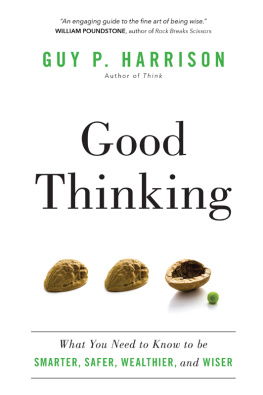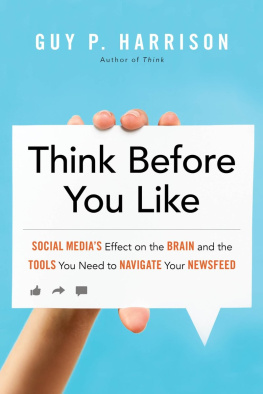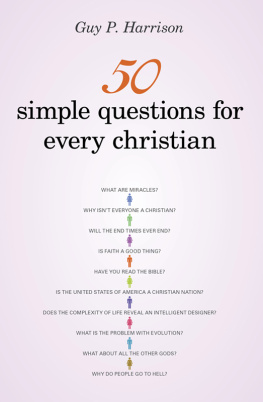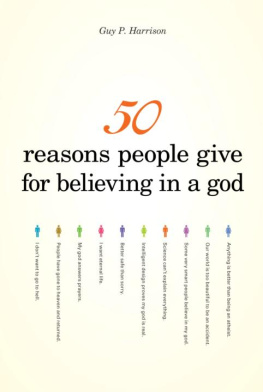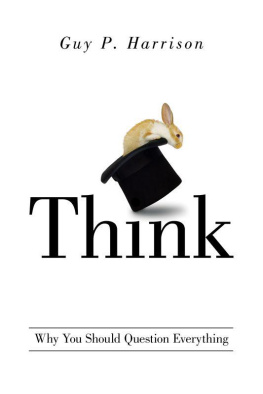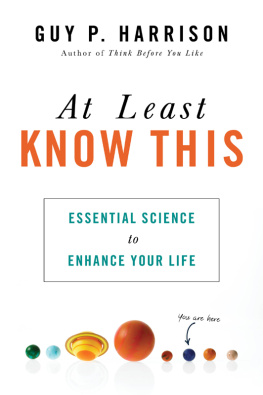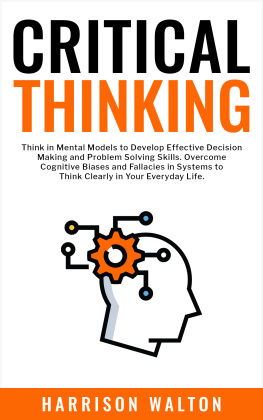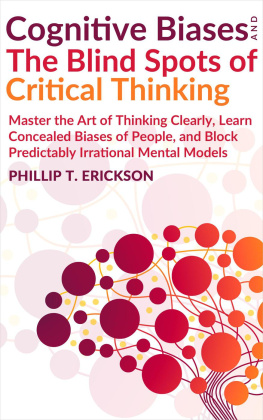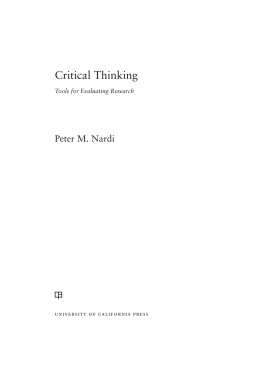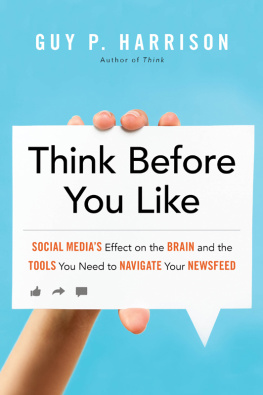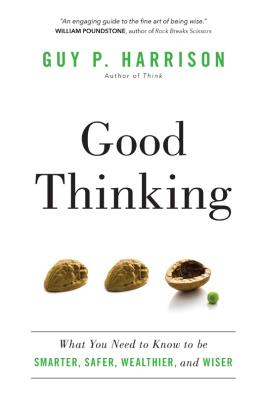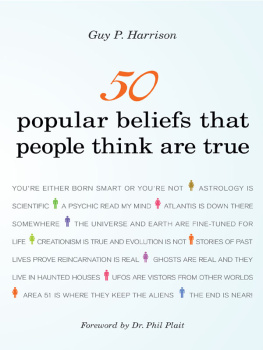
I am deeply grateful to the following people for their valuable contributions to this book: Jade Zora Scibilia, Sheree Harrison, Coni Harrison, Nicole Sommer-Lecht, Catherine Roberts-Abel, Steven L. Mitchell, Peter A. Lukasiewicz, Mark Hall, Fred Gage, Mahzarin Banaji, Jon Simons, Lane Kamp, Benjamin Radford, Kenneth Feder, Nick Wynne, John F. Pfister, Jim Bower, John Byrne, Chanel Prabatah, Cameron Smith, Julien Musolino, and Seth Shostak.

Guy P. Harrison is a passionate advocate for science and reason who says he hates to see people suffer unnecessarily. He calls the challenge of good thinking a moral issue and points to poor reasoning as humankind's great unrecognized crisis. Guy enjoys sharing his positive, constructive style of skepticism and science appreciation with people whenever possible. He has a degree in history and anthropology and has visited more than twenty countries on six continents. Having seen some of the best and worst of our world, he believes that we can do better. Guy maintains that if more people embraced critical thinking and had a better understanding of basic brain processes such as sensory perception, memory, and subconscious biases, we could eliminate a significant amount of human suffering and become much more efficient, safer, and productive as a species.
As a journalist, Guy has worked in many roles, including editorial writer, world-news editor, sports editor, reporter, feature writer, and columnist. He won the Commonwealth Award for Excellence in Journalism and the WHO (World Health Organization) Award for Health Reporting. Guy has also interviewed many leading scientists and significant historical figures. He has written about many diverse topics, including poverty in the developing world, conservation issues, religion, war, racism, gender discrimination, space exploration, and human origins.
Although he says he's an introvert, Guy never misses a chance to spread science and reason with others. He has been a guest on more than one hundred radio shows and podcasts and was a featured speaker at a science festival in New Zealand and at a Random House conference in San Diego, California.
Guy is the author of five previous books that have been popular with readers and highly acclaimed by critics. They are: Think: Why You Should Question Everything; 50 Simple Questions forEvery Christian; 50 Popular Beliefs That People Think Are True; 50 Reasons People Give for Believing in a God; and Race and Reality: What Everyone Should Know about Our Biological Diversity. Random House selected Think as part of its national First Year Experience/Common Reads program, which promotes it as recommended reading for first-year university students.
Guy is a lifelong fan not only of science and history but also of science fiction. He says he's not ashamed to confess his deep love for robot uprisings, time machines, and interstellar travel. He lives in Southern California, where he enjoys running, hiking, biking, and writing.
Guy is also an expert blogger for Psychology Today. Read his essays at About Thinking, www.psychologytoday.com/blog/about-thinking. Visit his website at www.guypharrison.com.

Aamodt, Sandra, and Sam Wang. Welcome to Your Brain: Why You Lose Your Car Keys but Never Forget How to Drive, and Other Puzzles of Everyday Life. New York: Bloomsbury, 2008.
Aaronovitch, David. Voodoo Histories: The Role of the Conspiracy Theory in Shaping Modern History. New York: Penguin Group, 2010.
Ackerman, Jennifer. Sex Sleep Eat Drink Dream: A Day in the Life of Your Body. New York: Houghton Mifflin Books, 2007.
Bader, Christopher, F. Carson Mencken, and Joseph Baker. Paranormal America: Ghost Encounters, UFO Sightings, Bigfoot Hunts, and Other Curiosities in Religion and Culture. New York: New York University Press, 2010.
Banaji, Mahzarin R., and Anthony G. Greenwald. Blind Spot: Hidden Biases of Good People. New York: Delacorte, 2013.
Barker, Dan. Maybe Yes, Maybe No: A Guide for Young Skeptics. Amherst, NY: Prometheus Books, 1990.
Barret, James. The Future of the Brain: The Promise and Perils of Tomorrow's Neuroscience. New York: Thomas Dunne Books, 2013.
Barrett, Stephen, and William T. Jarvis, eds. The Health Robbers: A Close Look at Quackery in America. Amherst, NY: Prometheus Books, 1993.
Bartholomew, Robert, and Benjamin Radford. Hoaxes, Myths, and Manias: Why We Need Critical Thinking. Amherst, NY: Prometheus Books, 2003.
Bausell, R. Barker. Snake Oil Science: The Truth about Complementary and Alternative Medicine. Oxford: Oxford University Press, 2009.
Bendheim, Paul E. The Brain Training Revolution: A Proven Workout for Healthy Brain Aging. Naperville, IL: Sourcebooks, 2009.
Blech, Jorg. Healing through Exercise: Scientifically Proven Ways to Prevent and Overcome Illness and Lengthen Your Life. Cambridge, MA: Da Capo, 2009.
Bloom, Floyd E., ed. Best of the Brain from Scientific American: Mind, Matter, and Tomorrow's Brain. New York: Dana, 2007.
Boghossian, Peter. A Manual for Creating Atheists. Charlottesville, VA: Pitchstone, 2013.
Bogin, Barry. Patterns of Human Growth (Cambridge Studies in Biological and Evolutionary Anthropology). Cambridge, UK: Cambridge University Press, 1999.
Brafman, Ori, and Rom Brafman. Sway: The Irresistible Pull of Irrational Behavior. New York: Doubleday, 2008.
Brockman, John, ed. The Mind: Leading Scientists Explore the Brain, Memory, Personality, and Happiness. New York: Harper Perennial, 2011.
. Thinking: The New Science of Decision-Making, Problem-Solving, and Prediction. New York: Harper Collins, 2013.
. This Will Make You Smarter: New Scientific Concepts to Improve Your Thinking. New York: Harper Perennial, 2009.
. What Have You Changed Your Mind About? New York: Harper Perennial, 2009.
Buonomano, Dean. Brain Bugs: How the Brain's Flaws Shape Our Lives. New York: W. W. Norton, 2011.
Burton, Frances. Fire: The Spark That Ignited Human Evolution. Albuquerque: University of New Mexico, 2009.
Burton, Robert A. On Being Certain: Believing You Are Right Even When You're Not. New York: St. Martin's, 2008.
. A Skeptic's Guide to the Mind: What Neuroscience Can and Cannot Tell Us about Ourselves. New York: St. Martin's, 2013.
Calder, Nigel. Magic Universe: A Grand Tour of Modern Science. New York: Oxford University Press, 2003.
Capaldi, Nicholas, and Miles Smit. The Art of Deception: An Introduction to Critical Thinking. Amherst, NY: Prometheus Books, 2007.
Carey, Benedict. How We Learn: The Surprising Truth about When, Where, and Why It Happens. New York: Random House, 2014.
Carroll, Robert Todd, ed. The Skeptic's Dictionary: A Collection of Strange Beliefs, Amusing Deceptions, and Dangerous Delusions. Hoboken, NJ: John Wiley and Sons, 2003.
Carter, Rita. The Human Brain Book. New York: DK Adult, 2009.
Chabris, Christopher, and Daniel Simons. The Invisible Gorilla and Other Ways Our Intuitions Deceive Us

